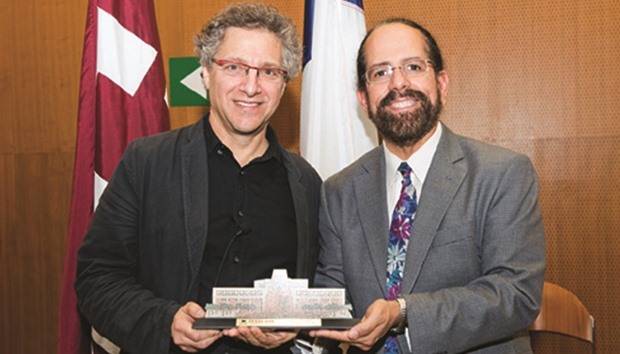The first talk in Texas A&M University at Qatar’s 2016-2017 Distinguished Lecture Series on Tuesday focused on how some nuclear waste contaminated sites have become biodiverse lands.
Harvard University’s Dr Peter L Galison’s “Wastelands and Wilderness: Nuclear Lands” tackled about an irony, where wastelands and wilderness – two apparent opposites – inhabit the same place.
“Radioactivity has been good for wildlife. Yet, because of the Fukushima nuclear disaster and other past events, there is worldwide concern about the storage and disposal of waste from nuclear power, which must last thousands of years into the future to avoid contamination,” Galison said.
“How do we warn for 10,000 years? Nuclear waste has forced us to think about how to warn the future and reflect on our relationship with the future,” he added.
Galison is the Joseph Pellegrino University professor and director of the Collection of Historical Scientific Instruments in the Department of the History of Science at Harvard.
His main work explores the complex interaction between the three principal subcultures of 20th century physics — experimentation, instrumentation and theory. He has written several books, and Image and Logic won the Pfizer Award from the History of Science Society in October 1998.
In addition, Galison has launched several projects examining the powerful cross-currents between science and other fields.
Further work on the boundary between science and other fields includes several co-edited volumes on the relations between science, art and architecture.
Galison was named a John D and Catherine T MacArthur Foundation Fellow in 1997 and received the Max Planck Prize given by the Max Planck Gesellschaft and Humboldt Stiftung in 1999.
Texas A&M at Qatar’s Distinguished Lecture attracts world-class experts to campus, encouraging discourse among faculty and researchers in Education City and the local community on important topics in science, engineering and technology.
This sharing of scholarship fosters intellectual discourse and encourages the development of critical thinking, lifelong learning and a responsibility to global awareness.

Dr Peter L Galison (left) and Dr Cesar Malave at Tamuq’s lecture series.
